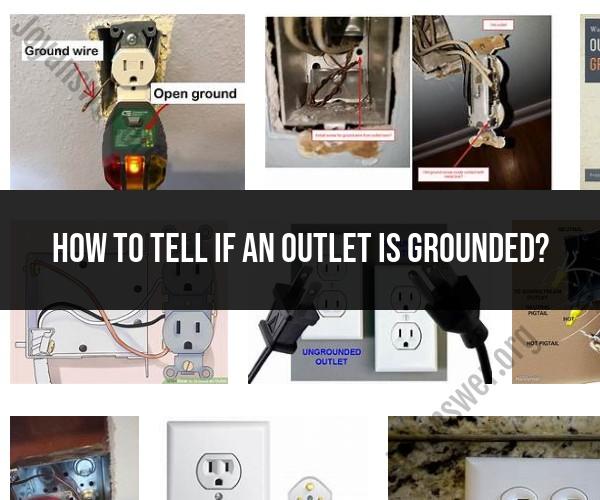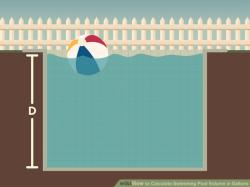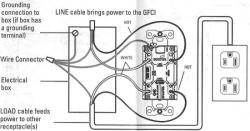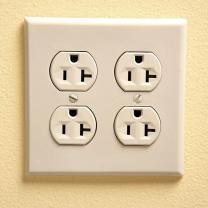How to tell if an outlet is grounded?
Determining whether an outlet is grounded or not is important for electrical safety, especially when using appliances and devices that require grounding. Here are several methods you can use to check if an outlet is grounded:
Visual Inspection:
- Look at the outlet itself. Grounded outlets typically have three holes or slots: two vertical slots and a round or U-shaped hole beneath them. The presence of the round hole is a clear indicator that the outlet is grounded.
Check for the Third Prong:
- Inspect the plug of the device or appliance you intend to use with the outlet. It should have a three-prong plug, with one of the prongs being the grounding prong. If your plug has only two prongs, it's likely not designed for a grounded outlet.
Use a Circuit Tester:
- A circuit tester or receptacle tester is a handy tool to determine if an outlet is properly grounded. Here's how to use it:
- Insert the tester into the outlet.
- The tester will have a series of lights or indicators. If the outlet is grounded, the tester should display the appropriate indicator.
- Follow the instructions on the tester to interpret the results. It may indicate whether the outlet is wired correctly and grounded.
- A circuit tester or receptacle tester is a handy tool to determine if an outlet is properly grounded. Here's how to use it:
Inspect the Circuit Panel:
- If you have access to your electrical circuit panel (breaker box), you can check if the outlet is grounded from there. Look for a dedicated grounding wire connected to the circuit's grounding bus bar. This wire should be connected to the grounding screw of the outlet.
Consult a Licensed Electrician:
- If you are uncertain about the grounding status of an outlet or if you encounter any issues during your inspection, it's advisable to consult a licensed electrician. They have the expertise and tools to accurately assess and correct grounding problems.
Older Homes and Outlets:
- In older homes, you may encounter ungrounded outlets. Homes built before the 1960s often lacked grounded outlets, and upgrading them may require rewiring the electrical system.
Keep in mind that it's essential to have grounded outlets in areas where grounded appliances and devices are used, as it provides an extra layer of safety by diverting electrical faults away from you and preventing electrical shocks. If you find that an outlet is not grounded and you need to use grounded devices in that location, it's best to consult with a qualified electrician to discuss the possibility of upgrading the outlet and ensuring your electrical system meets current safety standards.
Detecting Grounded Outlets: How to Tell If Your Outlet Is Grounded
There are two ways to tell if an outlet is grounded:
- Look at the outlet. Grounded outlets have three slots: two vertical slots for the hot and neutral wires, and a round hole for the ground wire. Ungrounded outlets only have two slots.
- Test the outlet. You can buy a circuit tester at most hardware stores. To test the outlet, plug the tester into the outlet. If the tester lights up, the outlet is grounded. If the tester does not light up, the outlet is not grounded.
Ensuring Electrical Safety: Testing for Grounded Outlets
It is important to test your electrical outlets regularly to make sure that they are grounded. Grounded outlets help to protect you from electrical shock and fires.
To test an outlet for grounding:
- Turn off the power to the outlet at the breaker box.
- Remove the outlet cover plate.
- Touch the tester probe to the ground wire (the bare copper wire or the green wire).
- Touch the other tester probe to one of the other wires (the hot or neutral wire).
- If the tester lights up, the outlet is grounded. If the tester does not light up, the outlet is not grounded.
Outlet Grounding Checks: A Homeowner's Guide
Here is a homeowner's guide to outlet grounding checks:
- Test all of your outlets regularly. It is recommended that you test your outlets at least once a year.
- Test outlets that are used frequently. Outlets that are used frequently, such as those in the kitchen and bathroom, should be tested more often.
- Test outlets that are near water sources. Outlets that are near water sources, such as those in the kitchen and bathroom, should be tested more often.
- Have your outlets grounded by a qualified electrician. If you have ungrounded outlets in your home, you should have them grounded by a qualified electrician.
Grounding your electrical outlets is an important safety measure. By testing your outlets regularly and having them grounded by a qualified electrician, you can help to protect yourself and your family from electrical shock and fires.
Please note that if you are not comfortable testing your outlets yourself, you should contact a qualified electrician to do it for you.












